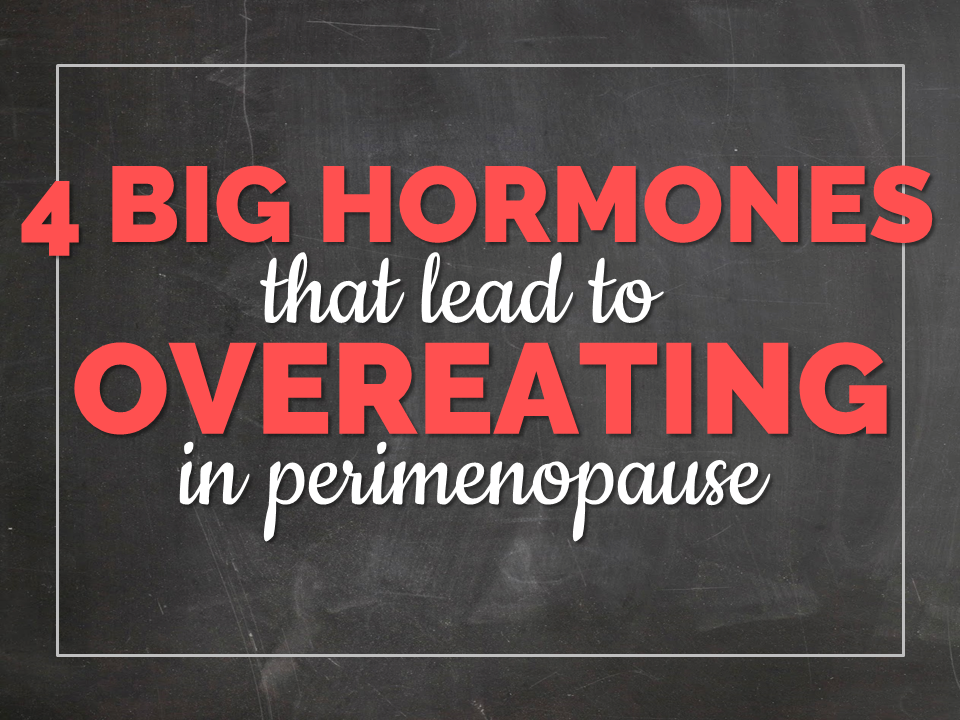Does life feel boring and routine?
- Order sushi! Or pop open a bottle of champagne!
Do you feel down in the dumps?
- Lasagna feels like a warm blanket on the inside.
Are you stressed and overwhelmed with work?
- Order a pizza, who has time to cook?
Enjoying summer with friends?
- Slap eight types of meat on the barbecue, and wash it down with one (make it two!) bottles of wine. Each.
Frustrated because you can’t sleep?
- A little ice cream sure goes down nice.
Like it or not we often use food (and drink) to change our mood.
We feed ourselves to feel better emotionally.
And this tendency might actually INCREASE when you’re in perimenopause.
Now, not to make excuses, but if you’re in perimenopause like me, your hormonal defenses are also down.
Estrogen is fluctuating and decreasing.
That has an impact on other hormones, affecting your mood AND the food you are unconsciously drawn to.
And possibly, wreaking havoc with your weight.
So, what are these hormones?
Here are four big ones, and what you can do to help yourself…
Dopamine
Dopamine is also known as the feel-good hormone.
Of course, in perimenopause, dopamine tends to decrease with decreasing estrogen.
And this drop can make you moody, reduce your ability to focus, and make you feel less motivated.
Enter food.
In particular, highly rewarding foods.
These are those calorie-dense and highly palatable foods, like pizza, pastries, bread, pasta, chips, crackers, chocolate,….
Even the sight or smell of these foods can trigger a dopamine release.
And that can make them seem irresistible.
So, giving into temptation, you get rewarded with those feel-good feelings.
Temporarily.
Long-term, however, to increase your dopamine, the first thing to do is be aware.
Be onto yourself and your changing hormones.
And instead, choose foods that are higher in magnesium and a protein called tyrosine.
Foods like chicken, almonds, apples, avocados, bananas, beets, chocolate, green leafy vegetables, green tea, lima beans, oatmeal, oranges, peas, sesame and pumpkin seeds, tomatoes, turmeric, watermelon and wheat germ.*
And also make time for activities that feel good to you.
It’s not only food that makes you to feel good, but movement, social connections, and even work can also lift you up.
With dopamine in check, let’s move on…
Leptin
Leptin is the hormone that lets you know that you’re satisfied.
So, when it senses you’ve had enough food, it triggers unpleasant feelings so you’ll stop eating.
However, in perimenopause, when estrogen is fluctuating, leptin is also fluctuating.
So, you may not get the message that you’ve had enough.
And you may continue to feel like you’re hungry.
This can be a problem.
And if you’re already overweight or obese, leptin resistance is also a thing to be aware of.
Without enough leptin, or a good responsiveness to it, you can eat over and above what you need.
And gain extra fat.
The good news is that there’s a way around it.
It involves eating foods that are less calorie-dense and more fibre-filled, or higher in protein.
So, basically eating foods that will fill your stomach but won’t break the calorie bank.
And these foods tend to be those closest to their natural state.
Foods like fruits, veggies, beans, lentils, eggs, yogurt, and lean meats.
No need to blame it on leptin, you’ve got this.
Next…
Cortisol
If sleep has become an issue for you in perimenopause, your cortisol levels are likely affected.
Cortisol is the stress hormone.
And we need a certain amount of it to keep us awake and productive.
Ideally, it’s great to have higher cortisol in the morning and earlier in the day, and then have it decline as you approach bedtime.
However, with your busy life that tends to get more stressful as the day goes on, and your estrogen levels skewed in perimenopause, your cortisol levels are likely out of whack.
The issue here is that when your cortisol is higher, you also tend to be hungrier.
Basically, when you’re stressed, your body thinks you need more energy.
Hunger goes up.
And in particular, high cortisol prefers calorie-dense, palatable foods like the ones I mentioned in the Dopamine section.
And you know the rest.
To get out of this loop, there are a couple of things you can do.
First, create a sleep routine that gets you the sleep you need.
Second, make a practice of doing things during your day that get you out of your busy, stressed mind.
Things like breathing consciously, meditation, yoga, and walking.
Insulin
Like cortisol, I’ve talked about insulin many times.
Insulin in the energy storing hormone.
And it’s responsible for bringing glucose (energy) into your cells.
However, when you’re eating mostly processed foods, glucose spikes like an up-and-down yo-yo in your blood, and insulin levels, as they follow glucose, also spike.
Over time, with frequent spikes, your cells may become insulin resistant and won’t get the energy they need.
So, you’ll feel hungry.
And in particular, you’ll crave sugar.
Now, this situation becomes even more of an issue in perimenopause, because low estrogen is also associated with insulin resistance.
So, what can you do?
Eat whole foods as much as possible, and minimize or eliminate alcohol.
Doing those two things will go a long way in getting your hormones back on track.
You can control your hormones
Although your mood and food habits may feel off, you do have some control.
Your body isn’t against you.
It’s just changing.
So what your body needs has to change too.
The biggest obstacle here isn’t your body.
It’s your mind.
Making the changes I mentioned above aren’t difficult, but your mind will likely resist them.
Coaching is a great way to get you over and around these mind-made obstacles.
And this fall, I’m making coaching available to even more women.
In September, I’ll be launching the Belly Fat to Belly Fit Group Program.
I’ll be leading a small group of women, coaching on all topics related to perimenopause and belly fat, and creating space for connection and sharing experiences.
If this sounds like something that might interest you, let me know.
Just REPLY to this email.
In the meantime, keep moving forward,
Debbie
P.S. Are you feeling moody and overeating the wrong foods? You’re not alone. Let’s talk about it and what you can do. Contact me for a free consultation.
Email me, message me, or book a time to talk through Zoom.
*List of foods from an article written for the Cleveland Clinic, “Dopamine Deficiency”, https://my.clevelandclinic.org/health/articles/22588-dopamine-deficiency


